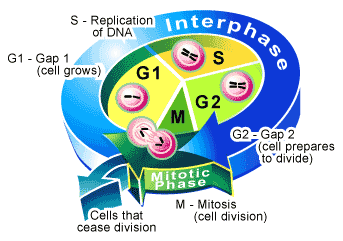1.Two reasons cells divide are (1) the larger the cell becomes, the more demands the cell places on its DNA and (2) the more trouble the cell has moving enough nutrients and wastes across the cell membrane.
2. A cell's DNA is like the books in a library because it stays the same. In a growing town, the library doesn't grow with it, it stays the same just like DNA in a cell--the DNA doesn't grow with the cell.
3. Cell division is the solution to the problems caused by cellular growth.
4. As a cell increases in size, the cell's volume increases more rapidly than its surface area.
5.Surface area=72cm squared. Volume=64cm cubed. Ratio=9:8
Thursday, January 10, 2008
10.2 pg. 249
1. During the cell cycle, a cell grows, prepares for cell division and divides to form 2 daughter cells, each of which then begins the cell cycle again.
2. Biologists divide the events of mitosis into 4 phases: prophase, metaphase, anaphase and telophase.
3. The cell grows and replicates its DNA and centrioles.
4. Chromosomes are made up of DNA.
5.Prokayrotic cells divide during anaphase.
6.Cytokinesis takes place in an animal cell, the cell membrane is drawn inward until the cytoplasm is pinched into two nearly equal parts.
2. Biologists divide the events of mitosis into 4 phases: prophase, metaphase, anaphase and telophase.
3. The cell grows and replicates its DNA and centrioles.
4. Chromosomes are made up of DNA.
5.Prokayrotic cells divide during anaphase.
6.Cytokinesis takes place in an animal cell, the cell membrane is drawn inward until the cytoplasm is pinched into two nearly equal parts.
10.3 pg 252 review
1. Cyclins regulate the timing of the cell cycle in eukarotic cells.
2. Cancer cells do not resond to the growth of most cells. As a result, they form masses of cells called tumors that can damage the surrounding tissue.
3.Chromosome damage builds up when cells respond to contact with other cells. 4. Cancer cells dont respond to the signals that would normally stop them dividing. Masses of cancer cells form tumors that can damage normal tissue. These cancer cells are from a cancer tumor in the large intestine.
5. If cyclin were incerted into a cell that was in mitosis, the timing would be all messed up.
2. Cancer cells do not resond to the growth of most cells. As a result, they form masses of cells called tumors that can damage the surrounding tissue.
3.Chromosome damage builds up when cells respond to contact with other cells. 4. Cancer cells dont respond to the signals that would normally stop them dividing. Masses of cancer cells form tumors that can damage normal tissue. These cancer cells are from a cancer tumor in the large intestine.
5. If cyclin were incerted into a cell that was in mitosis, the timing would be all messed up.
Monday, January 7, 2008
Biology Words
Cell Division- process by which a cell divides into two new daughter cells
Chromatid- one of two identical "sister" parts of a duplicated chromosome
Centromere- area where the chromatids of a chromosome are attached
Interphase- period of the cell cycle between cell divisions

Centromere- area where the chromatids of a chromosome are attached
Interphase- period of the cell cycle between cell divisions

Cell Cycle- series of events that cells go through as they grow and divide

Mitosis- part of eukaryotic cell division during which the cell nucleus divides

Prophase- first and longest phase of mitosis, during which the chromosomes become visible and the centrioles separate and take up positions on the opposite sides of the nucleus

Centriole- one of two tiny structures located in the cytoplasm of animal cells near the nuclear envelope

Spindle- fanlike microtubule structure that helps separate the chromosomes during mitosis
Metaphase- second phase of mitosis, during which the chromosomes line up across the center of the cell

Anaphase- the third phase of mitosis, during which the chromosome pairs and separate and move toward opposite poles
Telophase- fourth and final phase of mitosis, during which the chromosomes begin to disperse into a tangle of dense material
Friday, January 4, 2008
Theodor Schwann
I love the scientific studies of the
Biological process more commonly know by
teenagers as "BIO!" I also enjoy long walks on the
beach and beautiful candlelight dinners.
Dancing is my love, but honestly I
love Biology the most.
Subscribe to:
Posts (Atom)


